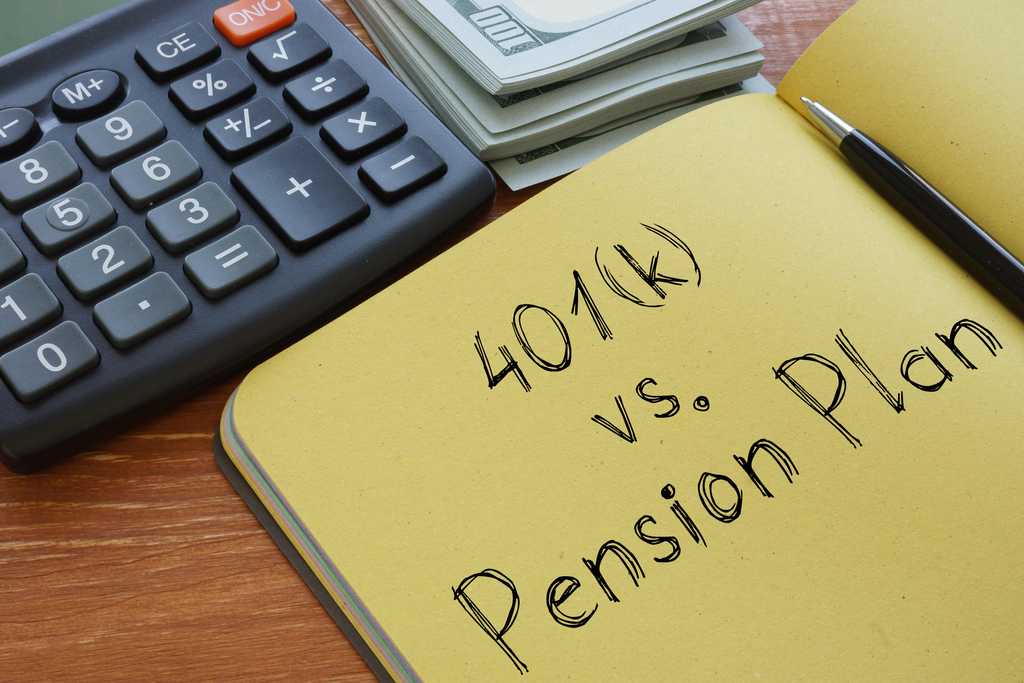Most companies provide some type of retirement plan for their full-time employees. It allows workers to save money until they leave the workforce at an older age, and many employers contribute to these plans, essentially giving workers free money.
Two of the most common retirement plans are the 401(k) and the pension plan. While both plans allow employees to save up for retirement, there are several things that separate the two. In this guide, we’ll help you understand the differences between a 401(k) and a pension, and explain which one might be the better option for you.
What is a pension plan?
A pension is a retirement plan that can be paid into by an employee, their employer, or both parties. Typically, the employer covers the largest percentage of the monetary contributions, as an incentive for the employee to continue their employment for a long period of time.
Every company’s pension plan is slightly different. In most cases, your pension is based on a percentage of your average salary during the final years of employment, which are usually your highest earning years. The pension formula can also account for the number of years you worked at the company.
The money that you contribute to your pension plan gets put into a pool of money paid by all the pension participants at the company, and is invested by a professional. Upon retirement, each employee receives the money from their pension, which provides a regular payment over a certain period of time. Typically, you can access money from your pension when you turn 65.
While many companies still provide pension plans, they have become less common overtime. According to the Pension Rights Center, only about 21% of all American workers exclusively participate in a pension plan. Pensions are significantly more common for union workers and government employees. Roughly 76% of state and local government workers have a pension.
What is a 401(k) Plan
A 401(k) plan is a retirement plan that is traditionally funded by the employee and their employer. Many employers offer to match employee 401(k) contributions, up to a certain dollar amount or percentage.
Money that gets paid into a 401(k) plan is invested in the stock market, more specifically, in mutual funds or exchange-traded funds (ETFs). When the employee opens a 401(k), they get to choose which funds the money gets invested in, with conservative and aggressive options, depending on their risk tolerance and investing strategy.
The idea behind a 401(k) is that your money has the opportunity to grow during the years that you work. If your investments perform well, your account can steadily grow, leading to a much bigger payout when you cash out your 401(k) at 59 ½ years old.
Like with a pension, the funds invested in a 401(k) usually come directly out of your paycheck. You tell your employer how much you want to contribute at your desired interval, and they do the work for you. As an added bonus, the amount of money you contribute will lower your taxable income.
Difference between pension and 401k
There are a few big differences between a pension and a 401(k). Before you choose one or the other, it’s important to understand how each works.
The first thing to know is how the payout structure works.
With a 401(k), you and your employer contribute money on a consistent basis during your career. You choose where the money gets invested and watch it grow overtime. With a pension, you contribute to a pool of money that gets invested by a financial professional. Your employer assumes the risk instead of you.
Another difference is the maximum contribution limit.
For a 401(k), the annual contribution limit is $19,500, or $26,000 if you are 50 or older. The pension contribution limit depends on the specifics of your pension terms and your job title, but the maximum limits are usually much higher than they are for a 401(k).
The last major difference between a pension and 401(k) is when you can take the money.
With a 401(k), you are usually allowed to access the money (penalty-free) when you turn 59 ½. You can technically pull out the money early for qualifying expenses, but you’ll probably take a 10% hit. With a pension, you’re typically allowed to withdraw the money at age 65, unless you can qualify for early retirement benefits.
Pension vs 401(k): Which Is Better?
A pension and a 401(k) both have benefits and drawbacks for employees who want to save for retirement. At the end of the day, it also depends on which one your employer offers. While some companies offer both options, you might get stuck with one or the other.
Generally speaking, a 401(k) is a better option if you are a savvy investor, or want to pick your investment funds. Because of that, however, a 401(k) is a riskier choice. It’s always possible that you could lose money in the event of a major market crash, leaving you with less money that you had originally planned to save for retirement.
On the other hand, many pensions are guaranteed, meaning you can’t lose money. It offers peace of mind knowing that you won’t face any unexpected surprises when it comes time to retire. But, you could miss out on growth opportunities because you aren’t able to choose your investments. Plus, pensions are becoming less common, and if your company’s plan is underfunded or poorly managed, your pension benefits could potentially be terminated.
Another thing to think about when choosing between a pension and a 401(k) is when you are planning to retire. With a 401(k), you can claim the money at a younger age than you can with a pension. There are exceptions, but in general, you should consider a 401(k) if you want to retire before 60.

